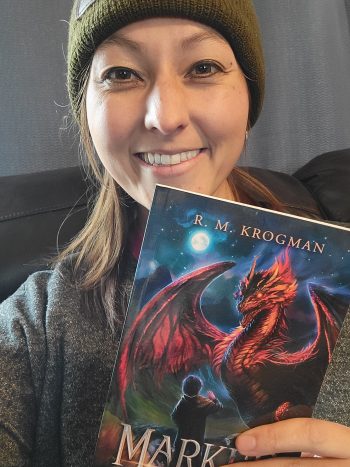
About R. M. Krogman:
Hi, I'm Rebecca, an epic and dark adult fantasy author from the central U.S. My debut novel LIBERATION is the first volume of a larger story set in Midgate, a medieval-inspired world of magic, mermaids, and wyverns. I've been developing the Keepers of Midgate epic since I was in high school. The main storyline has changed little since then, only gaining more clarity and detail as the characters take on a life of their own. The world has grown in its depth of history, culture, and geography, spawning numerous side stories and prequels.
I love nature, art, and food, which all funnel into my world-building. My story’s settings span two continents and the sea between, encompassing a diversity of peoples, cultures, and creatures. I'm working on a collection of recipes from Midgate, and I love drawing scenes and characters from the books (although those sketches may never see the light of day).
When I'm not writing about Midgate, I'm penning fairy tale retellings. Thanks for checking out my interview!
What inspires you to write?
I have always had an active imagination and vivid dreams, and I grew up consuming fantasy books. This particular world entered my being in early high school and just kept refining itself, expanding in depth and detail and history, until I felt I would go mad if I didn't write it down.
What authors do you read when you aren’t writing?
Anne McCaffrey, J. R. R. Tolkien, Michael Crichton, Brian Jacques, Henryk Sienkiewicz, George R. R. Martin, Richard Adams, Stephen King (sometimes)
Tell us about your writing process.
I am an obsessive outliner. When I first started, I had each major plot point listed in a long Word document of bullets, but I now have a much improved strategy. I lean on a lot of guidance from "Save the Cat! Writes a Novel" and highly recommend it for structuring a satisfying story. I use a spreadsheet to first identify each character's story type, issues, growth arc, and key interacting characters. Then I outline scene-by-scene the progression of that particular character's story from beginning to end, ensuring it follows the key turning points and pace for that story type. Since I have multiple points of view in my books, I found that I do have to do this for every single one, not just the main character. I also use a visual story board called Prezi to lay out the timeline, thereby fitting everything together. It's organized by location and time, which each character following their own route through key plot points, so it ends up looking kind of like a bus map. That's all the planning! When I actually sit down to write, I use Reedsy because it is so easy and mobile-friendly, so I can take my draft anywhere.
For Fiction Writers: Do you listen (or talk to) to your characters?
I don't directly interact with them, although sometimes I dream about them. I can easily imagine them in situations though, envisioning how they would react to something.
What advice would you give other writers?
Give yourself grace and patience. Writing is a skill that develops with time, practice, and intentional study. Even if you are naturally a strong writer, you will still have areas that could improve. Give yourself the time to garner feedback, the humility to accept criticism, the grace to forgive yourself for not being perfect, and the patience to soldier onward. I’ve heard the first million words written are considered a writer’s apprenticeship, and I can certainly agree that it takes at least a few hundred thousand to find your own voice and settle into a style. All the while, you should study the craft of storytelling and strive to develop good habits that keep you on track and productive.
How did you decide how to publish your books?
I chose to self-publish for several reasons. First, I am obsessive about control over my book product. I have a vision of that story, its cover, its art, and I would be heartbroken to see it polluted by someone who cares less about it than I do. Second, I am not a patient person. I tend to run headlong into everything I do, and waiting patiently for publishing houses to respond to my queries sounded interminably frustrating.
What do you think about the future of book publishing?
I believe there is a place for a wide variety of publishing strategies, but I hope that more independent processes become more accessible to small-time authors. Printing in bulk is rarely affordable for someone outside of a publishing house, and there aren't as many print-on-demand services out there that can make a competitively priced book as I would like. This is particularly true if you want to create special editions, hardcovers with beautiful sprayed edges and embossed fronts, colorful interior art and stunning maps. I also worry about the inundation of the market with AI-generated content. The individual artists and authors who put their energy into creating high-quality products will find it increasingly difficult to connect with their audience when the market is swamped. I hope they always know their work is valuable, even if it is difficult to sell.
What genres do you write?: Epic and dark fantasy
What formats are your books in?: Both eBook and Print, Audiobook
Website(s)
R. M. Krogman Home Page Link
Link To R. M. Krogman Page On Amazon
Your Social Media Links
Goodreads
Facebook
Instagram
All information in this post is presented “as is” supplied by the author. We don’t edit to allow you the reader to hear the author in their own voice.
